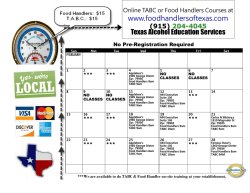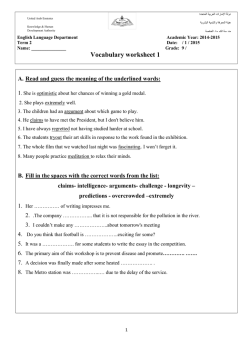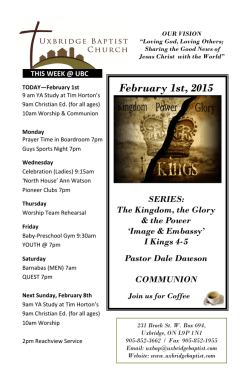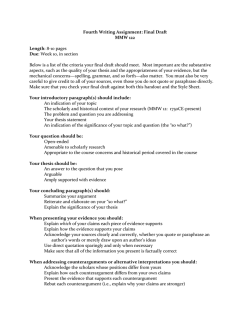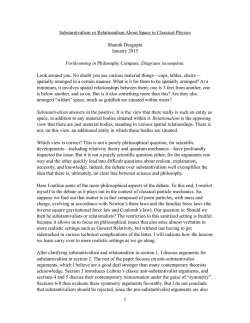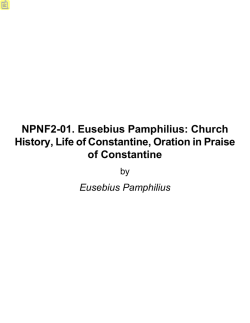
Syllabus and Schedule - California State University, Sacramento
California State University Sacramento Philosophy 105-01: Science and Human Values Spring 2015 Course Syllabus **********Read this now and refer to it regularly during the course********** Course Instructor and Details Course Information Name: Dan Weijers Office Location: 3018 Mendocino Hall. Office Telephone: (916) 278-7289 Office Hours: TR 3:00PM–4:30PM or by appointment (please note that my office hour on May 7 will be held on May 6 instead) Email: [email protected] Course Name: Science and Human Values Catalog Code: PHIL 105, Section 01 Days of Class Meetings: Monday and Wednesday Times of Class Meetings: 1:30-2:45PM Room of Class Meetings: MND3009 Contacting me: The best way to contact me is via email. I should respond to emails sent during business hours within a few hours and by the next business day morning at the latest. I do occasionally respond to emails outside of business hours, but that should not be relied upon. About the Course Catalog Description: Examination of the values implicit in a scientific culture and the problems that arise as a commitment to the development of scientific knowledge and technology. These problems include: distinguishing good scientific practice from bad; the intrinsic value of scientific knowledge independent of its benefits in application; the proper and improper applications of scientific knowledge. Units: 3.0. GE Area: This course satisfies GE area D. It is a writing intensive class, which requires students to write a minimum of 5,000 words. Prerequisites: You must have GWAR certification before Fall 2009; or WPJ score of 80 or above; or 3unit placement in ENGL 109M/W; or 4-unit placement in ENGL 109M/W + co-enrollment in ENGL 109X; or WPJ score 70/71 + co-enrollment in ENGL 109X. Course Objectives: The course examines the following questions: 1. What is the role of science in society? How has science as the process and product of human inquiry changed human culture? 2. What values underlie a scientific world-view and which guide scientific research efforts? 3. How do human values affect science and how does science affect human values, interests, activities and goals. 4. Does science offer evidence for or against a universal set of values? 5. Do human values such as justice, kindness, compassion, intimacy, and love have any place in scientific practice or progress? 6. Science tells us that we are the products of our genes and our environments, but can it offer any advice for how to cope with this brute fact in a world of desperate, selfish, competitive, voyeurs and narcissists? How shall individuals live, given our evolved impulses, emotions, and cognitive capabilities? 7. Are there questions for which scientists should not seek answers, or are there areas of human activity that should not be influenced by science? Are there any moral limits to scientific explanations, experiments and technological innovation? 8. Is science enlightened, objective, rational, liberating and democratic or is it biased, subjective, male-centered, political, atheistic, and elitist? 9. Are vaccines, GM crops, and cloning safe? What should the public know about these technologies, given scientific findings? And what should we do about them? 10. Scientific progress and social advances conflict apparently with traditional values and popular worldviews. Are religious and scientific world-views really compatible? What shall we teach our children when science and tradition conflict? Outcomes: 1. Students discuss critically some key social and ethical values in historical contexts. Such values have influenced science as both a process and product of human interests. For example, we discuss the morality of the effects that scientific values and practices have had on women throughout history. We also describe and evaluate various values that underpin scientific thinking, such as honesty. 2. Students apply the principles and methods of various scientific disciplines to the study of social and individual behavior by considering recent scientific trends in research programs. For example, relatively new sciences such as evolutionary biology and psychology describe and explain human cognition and behavior under the assumption that rationality and culture are evolved physical systems shaped by our genetic endowments, environmental circumstances, and natural selection. Some, such as Sam Harris, even make the case that not only does this scientific perspective explain our moral sense, it also offers solutions to moral problems. If evolution has endowed us with universal ethical impulses, then emotional and cognitive adaptations to social living explain the origins and prevalence of, say, cooperation, reciprocal altruism, social contracts, a sense of fairness, and moral judgments. Students will examine whether and to what extent science determines human values and how, if at all, science helps us resolve moral and social problems. 3. Students examine major scientific movements and findings that have profound effects on the quality of human life, and the practice of science itself. Science offers to explain and guide these changes, but not without alienating lots of people resistant to major shifts in personal values and societal goals. Throughout the course, and especially in the later weeks, we focus our discussions on specific issues where science and public life intersect in conflicting and controversial ways. For example, students will show that they understand how significant these issues are by writing papers on such socially charged issues as the once anomalous role of women in scientific research, or whether vaccines, GM crops, and cloning are safe or should be regulated. Students also discuss how evolutionary biology has implications for religious worldviews and in particular their applications in public education. Through these examinations and discussions, students will demonstrate an understanding of the role of human diversity and how various human beliefs and values that tend to stem from that diversity can clash with science. 4. Especially while discussing these later issues, students will critically examine how social dynamics change over time and across cultures in ways that can be both usefully guided and misled by science. The encroachment of science into the moral realm will be the main example of this. Required Materials: 1. Science and The World, edited by Jeffrey Foss (Broadview Press). Available from the Bookstore, Amazon.com, and Broadview Press. 2. Additional required online videos, articles, and PDFs (all free) are noted on the schedule (see it on SacCT) Technology Requirements: Students must have a reliable way of accessing SacCT/BlackBoard. All important course announcements, information, and resources will be communicated and available through Blackboard (except the material in the required text). Furthermore, papers will be submitted via Blackboard, and grades and feedback on papers will only be available through blackboard. Technical problems must be directed to the ITC Help Line @ 278-7337. Grading and Assessment Grading: Your final grade is determined by how many points you earn out of 100%, with these grade floors: 94%=A, 90%=A-, 87%=B+, 84%=B, 80%=B-, 77%=C+, 74%=C, 70%=C-, 67%=D+, 64%=D, 60%=D(and F = all scores less than 60%). Definition of Grade Symbols. Your total points are calculated by adding the following differently weighted assessment items: Assessment Details Due date (all due % of Required to pass at 9AM) final the course? mark Participation 0.5 of a mark per useful Any class 7% Yes, at least 6 contribution to class contributions discussion Max of 0.5 per class Reading assignments 3 take home, short 02/03, 03/03, 9% Yes, at least 300 answer assignments 04/07 words ~300-350 words each Surprise reading Best 8 out of 12 count Any class day 24% Yes, at least 5 quizzes except for the quizzes first week Response to 150-300 words 2/20 (requires 1% No Smarthinking 1 prior submission of draft) Argument summary 500-550 words 2/20 5% Yes, at least 500 words Peer writing 2 substantial 2/24 2% No feedback 1 suggestions Analysis paper 1 1,000-1,100 words 3/13 10% Yes, at least 1,000 words Peer writing 2 substantial 3/17 2% No feedback 2 suggestions Analysis paper 2 1,000-1,100 words 4/17 10% Yes, at least 1,000 words Peer writing 2 substantial 4/21 2% No feedback 3 suggestions Position paper 200-300 words 5/5 1% No introduction and plan Position paper key 250-350 words 5/12 1% No argument Response to 150-300 words 5/18 (requires 1% No Smarthinking 2 prior submission of draft) (Final) Position paper 2,500-2,700 words 5/18 25% Yes, at least 2,500 words Total 100% There is no mid-term or final exam. Detailed information on each item of assessment can be found on SacCT in the Assignments area. Other Important Information Attendance at Class: Attending class is expected. The roll will be taken every day. Any student who misses 2 or more classes in the first 2 weeks may be administratively dropped to make room for students on the waitlist. Classroom Behavior: The other people in the class are people, so treat them with respect. Yes, even I am a person, so treat me with respect too! If you are unsure how to do this, please ask me during a class. When in class, I would appreciate it if you limit your use of screen-based technologies to group activities on the content of the current class and taking notes. Other use of these devices is offputting to me and other students. Plagiarism and other such issues: Don’t cheat. Plagiarism is a serious academic offence and is not tolerated. Always use quotation marks and a footnote citation to indicate sentences or passages you borrow from another author. Assignments in which plagiarism is found will at the least be graded at 0 (not just an F). ALL incidents of plagiarism will be reported both to the Department Chair and to the Judicial Officer in the Office of Student Affairs for possible further administrative sanction. You are responsible for reading and understanding the details of the University's plagiarism policy. All papers will be put through plagiarism software. See the current student handbook for further information on student rights and responsibilities. Here is a link to the university's honesty policy. Turnitin: Consistent with Sacramento State’s efforts to enhance student learning, foster honesty, and maintain integrity in our academic processes, Turnitin will be used to compare all students' papers in this course with multiple sources. The tool compares each student’s work with an extensive database of prior publications and papers, providing links to possible matches and a ‘similarity score’. The tool does not determine whether plagiarism has occurred or not. Instead, I will make a complete assessment and judge the originality of each student’s work. Students should submit papers to Turnitin assignments without identifying information included in the paper (e.g. name or student number), the system will automatically show me the name you registered under. Please note that, in order to promote academic honesty around the world, your papers will be retained in the global Turnitin repository. Make-up Work, Late Submissions, and Reasonable Accommodation: Quizzes may not be made-up. Late papers turned in after 9:00:00AM on their due dates will be docked 10% (e.g., A- 90% becomes B- 80%); later papers will not be accepted (i.e., papers submitted after midnight at the end of the due date will not be marked and will receive a zero grade). Allowances may be made for documented illness, or other family or personal emergencies if you contact me as soon as you can after the emergency and before the due date (i.e., extensions will usually not be given on or after the due date). Extra Credit: There will be several opportunities for students to earn extra credit in this course. Interested students should refer to the Extra Credit section in SacCT. Special Needs: Please tell me early if you have a disability requiring accommodation (documentation to SSWD, Lassen Hall 1008, 916-278-6955) or if you need to miss something to participate in officially recognized student activities. More information available here. We are here to help: Remember that we are here to help you learn as best we can. Please utilize my office hours for further feedback and guidance on course-related issues. Schedule: The schedule is a very important document for this course. The schedule shows you exactly what you can expect from every class and what you are expected to do to prepare for it. If the schedule changes, I will alert students in class, with an announcement on SacCT, and via an email to the address that is registered with SacCT. It is your responsibility to come to class, check SacCT, and check your SacCT-registered email. Wk 1 Date 01/26 Day M What Lecture Topic Introduction Details Learn about the course 1 01/28 W Lecture Introduction Learn about how to do well in the course 2 02/02 M Lecture What is Science? 2 02/03 Tu Assignment What is Science? 2 02/04 W Lecture 3 02/09 M Lecture 3 02/11 W Lecture 4 02/16 M Group work Lecture What is Science? What is Science? What is Science? Writing What is Science? What is Science? & Writing -There could be a quiz any day from today on -Be prepared to discuss study questions (text) Reading Assignment 1 due 9AM (submit to Turnitin) Be prepared to discuss study questions (text) Be prepared to discuss study questions (text) Be prepared to discuss study questions (text) Getting acquainted Be prepared to discuss study questions (text) Draft Argument Summary due 9AM (submit to Smarthinking via SacCT) Be prepared to discuss study questions (text) Discuss Argument Summaries Argument Summary & Response Letter 1 due 9AM (submit both to Turnitin as a single document) Be prepared to discuss study questions (text) Peer Writing Feedback 1 due 9AM (complete in Turnitin) Be prepared to discuss study questions (text) Discuss Peer Writing Feedback 1 Assignment 4 02/18 W Lecture Group work What is Science? Writing 4 02/20 F Assignment What is Science? & Writing 5 02/23 M Lecture 5 02/24 Tu Assignment Feminist Science Writing 5 02/25 W Lecture Group work Feminist Science Writing Required for the task -Read: Syllabus (SacCT) -Read: Getting Started (SacCT) Read: Introduction for students (text) Read: Chap 1 (text) Read: Chap 2 (text) Read: Chap 2 (text) Read: Chap 3 (text) Read: Chap 4 (text) Bring: Your best social skills Read: Chap 5 (text) Read: Siegel: Is Astrology a Science? Read: Introduction to Section 1 (text) Bring: Your current Argument Summary draft Read: Siegel: Is Astrology a Science? Read: Chap 7 (pp.117-124, 139-140) Read: Other student’s Argument Summary (Turnitin) Read: Chap 8 (text) Bring: Your Argument Summary and the Peer Writing Feedback you 6 03/02 M Lecture 6 03/03 Tu Assignment 6 03/04 W Lecture Video lecture Feminist Science Feminist Science & Writing Science and Religion Online discussion Science and Religion Lecture Science and Religion Feminist Science & Writing Feminist Science Science and Religion Writing Group work 7 7 03/09 03/11 M W Group work 7 03/13 F Assignment 8 03/16 M Lecture 8 03/17 Tu Assignment 8 03/18 W Lecture Group work H H 9 9 03/21 03/29 03/30 04/01 Sa Su M W 04/06 M Science and Religion Writing Holiday Holiday Video lecture Science and Religion Online discussion Science and Religion Lecture Science and Religion Writing Group work 10 Feminist Science Feminist Science Lecture Science and Religion Be prepared to discuss study questions (text) Reading Assignment 2 due 9AM (submit to Turnitin) Be prepared to discuss study questions (text) Discuss reading for Analysis Paper 1 (summary) Be prepared to discuss study questions (SacCT>Discussions>Evol ution vs Creationism) Bonus: two useful contributions will earn you 1 whole mark Be prepared to discuss study questions (text) Discuss reading for Analysis Paper 1 (critique) Analysis Paper 1 due 9AM (submit to Turnitin) Be prepared to discuss study questions (text) Peer writing feedback 2 due 9AM (complete in Turnitin) Be prepared to discuss study questions (text) Discuss Peer Writing Feedback 2 Spring break starts Spring break finishes Be prepared to discuss study questions (SacCT>Discussions>Shou ld Intelligent Design be taught in public schools?) Bonus: two useful contributions will earn you 1 whole mark Be prepared to discuss study questions (text) Sentence simplifying exercise Be prepared to discuss study questions (text) received (digital or hard copy) Read: Chap 9 (text) Read: Longino: Can There Be A Feminist Science? Read: Chap 25 (text) Bring: Your Reading Assignment 2 (digital or hard copy) Watch: Youtube: Bill Nye debates Ken Ham (video) Respond to questions and other student’s comments (SacCT>Discussions>Evoluti on vs Creationism) Read: Chap 14 (text) Bring: Your Reading Assignment 2 (digital or hard copy) Read: Longino: Can There Be A Feminist Science? Read: Chap 15 (text) Read: Other student’s Analysis Paper 1 (Turnitin) Read: Chap 16 (text) Bring: Your Analysis Paper 1 and the Peer Writing Feedback you received (digital or hard copy) Watch: PBS: Judgment Day: Intelligent Design on Trial (video) Respond to questions and other student’s comments (SacCT>Discussions>Should Intelligent Design be taught in public schools?) Read: Chap 17 (text; pp.323-331) Read: Chap 18 (text; pp.353-368) 10 04/07 Tu Assignment Science and Religion 10 04/08 W Lecture Science and Meaning Group work Science and Religion & Writing Happiness 10 04/09 Th Extra credit event 10 04/10 F Extra credit event Happiness 11 04/13 M Lecture 11 04/14 Tu Extra credit assignment Science and Meaning Happiness 11 04/15 W Lecture Science and Morality Group work Science and Religion & Writing Science and Religion Science and Morality Writing 11 04/17 F Assignment 12 04/20 M Lecture 12 04/21 Tu Assignment 12 04/22 W Lecture Science and Morality Group work Writing 13 04/27 M Lecture Cloning 13 04/29 W Lecture Cloning Group work Writing 14 05/04 M Lecture Cloning 14 05/05 Tu Assignment Varies 14 05/06 W Lecture Vaccines Reading Assignment 3 due 9AM (submit to Turnitin) Be prepared to discuss study questions (text) Read: Gould: Nonoverlapping Magisteria Discuss reading for Analysis Paper 2 (summary) Nammour Symposium details TBA (updates here) Nammour Symposium details TBA (updates here) Be prepared to discuss study questions (text) Nammour extra credit paper due 9AM (submit to Turnitin) Be prepared to discuss study questions (text) Bring: Your Reading Assignment 3 (digital or hard copy) Discuss reading for AP2 (critique) Bring: Your Reading Assignment 3 (digital or hard copy) Read: Web: Gould: Nonoverlapping Magisteria Read: Chap 21 (text) Analysis Paper 2 due 9AM (submit to Turnitin) Be prepared to discuss study questions (text) Peer Writing Feedback 3 due 9AM (complete in Turnitin) Be prepared to discuss whether science can answer moral questions Discuss Peer Writing 3 Feedback Be prepared to discuss study questions (text) Be prepared to discuss study questions (text) Discuss how to write a philosophy paper Be prepared to discuss study questions (text) Position Paper Introduction and Plan due 9AM (submit to Turnitin) Be prepared to discuss whether vaccines should be mandatory Read: SacCT: Tolstoy: My Confession (SacCT>Content>Readings) Read: Chap 19 (text) Read: Chap 20 (text) Read: Other student’s Analysis Paper 2 Watch: Harris: Science Can Answer Moral Questions (video) Bring: Your Analysis Paper 2 and the Peer Writing Feedback you received (digital or hard copy) Read: Chap 22 (text) Read: Chap 23 (text) Read: Chap 24 (text) Varies -Watch: PBS: The Vaccine Wars (video) - Read: Kluger: Who’s Afraid Group work Varies & Writing Discuss Position Paper Introduction and Plan Morality & TBA GM Crops David Brink talk details TBA (updates here) Be prepared to discuss your responses to the questions in the PBS website Position Paper Key Argument due 9AM (submit to Turnitin) Present your Position Paper key argument in 35 minutes Discuss Position Paper key argument 14 05/07 Th 15 05/11 M Extra credit event Lecture 15 05/12 Tu Assignment Varies 15 05/13 W Extra credit assignment Varies Group work Varies & Writing Writing clinic Extra credit assignment Writing 15 05/14 Th Morality & TBA 15 05/15 F Assignment Varies & Writing Exa m wee k 05/18 M Assignments Varies & Writing Get feedback on specific passages David Brink extra credit paper due 9AM (submit to Turnitin) Draft Position Paper due 9AM (submit to Smarthinking via SacCT) -Position paper due 9AM -Response letter to Smarthinking report 2 due 9AM (submit both as single document to Turnitin) of a Little Vaccine? (SacCT>Content>Readings) Bring: Position Paper plan and abstract (digital or hard copy) Read: PBS: Should We Grow GM Crops? Read: Sunstein: Don’t Mandate Labeling for GeneAltered Foods Bring: Your presentation materials Bring: Your Position Paper key argument (digital or hard copy) Bring: Your draft Position Paper (digital or hard copy)
© Copyright 2026
